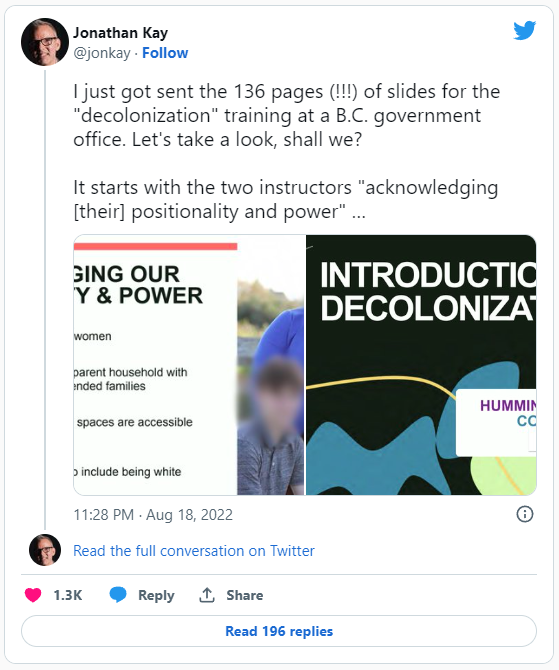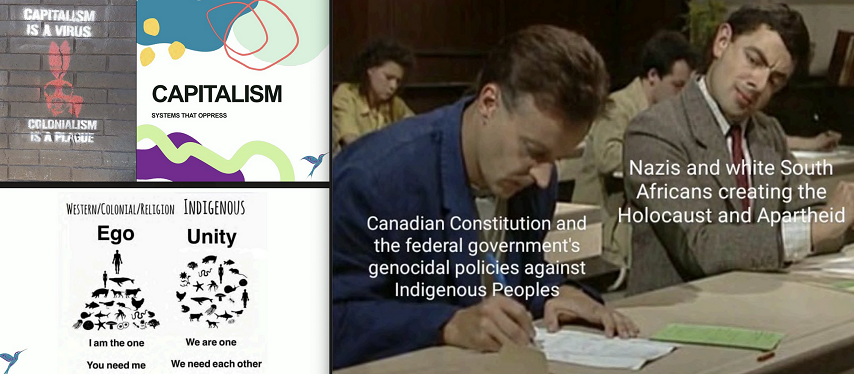In Quillette, Jonathan Kay tells the story of a civil servant in British Columbia who objected to the content of a “Gender Workshop”:
If you’re a white-collar Canadian, chances are good that you’ve received workplace lectures on the subject of “decolonization” — a vaguely defined project aimed at “deconstructing colonial ideologies of the superiority and privilege of Western thought”. It’s a decidedly cultish pedagogical genre that I’ve come to know well, because exasperated workers often send me screenshots and recordings from their training sessions. Since raising complaints about these materials internally would risk career-threatening accusations of “white fragility” and such, leaking them to journalists is seen by many employees as the only viable option.
One notable specimen I received last year was a 136-page module titled Introduction to Decolonization, which had been presented earlier that year by the Hummingbirds Rising consultancy to staff at British Columbia’s Office of the Ombudsperson (an entity self-described as “B.C.’s independent voice for fairness and accountability, [working] to make sure public sector organizations are treating people fairly and following the rules”). The roughly 100 attendees were told by the trainers that this would be a “brave space”, in which those who had concerns about decolonization could “be bold and brave [with their] questions and comments”. (According to a Deputy Ombudsperson, attendance at the organization’s all-staff Diversity & Inclusion events is typically listed as optional. In practice, staff told me, almost everyone feels that they are expected to attend.)
Much of the historical material presented in that session was perfectly accurate — including descriptions of the injustices associated with Canada’s system of Indigenous reserves. But as the presentation wore on, the content began to raise eyebrows. A section on economics declared flatly that capitalism is a “virus” composed of “systems that oppress”. A capsule lesson on spirituality presented Western values as inherently narcissistic, in contradistinction to Indigenous peoples’ quest for universal harmony. An array of listed terms that the presenters evidently associate with “white supremacy” included “being on time”, “manners”, and “perfectionism”. Most scandalously (as it would turn out), one slide indicated that the Nazi slaughter of six million European Jews had been directly inspired by the Canadian Constitution. Even more bizarrely, the slide was illustrated with a screen grab from an episode of Mr. Bean, a madcap 1990s-era British comedy show.
(When asked about the presentation, the Office of the Ombudsperson’s Communications Lead told Quillette that Hummingbirds Rising had been listed on the BC Public Service’s public pre-qualified supply list, and that prior vetting of the presentation had not been conducted by office staff. The Communications Lead added that the training was part of the Office’s “commitment to reconciliation with Indigenous people. Staff knowledge of cultural safety and the impacts of colonization on Indigenous people is an important component of the office’s Indigenous Communities Services Plan. We recognize that there may be some people who find some of the content of the Hummingbirds presentation controversial. We want to underscore, however, the value for our staff to fully understand the plurality of Indigenous perspectives in our province.”)
After sharing these images on Twitter, I was contacted by the Vancouver office of a prominent Jewish organization, whose leadership (understandably) found the Mr. Bean/Holocaust slide to be in extremely poor taste. Thanks to their efforts, the issue was reportedly taken up internally by BC’s provincial government. And in the months that followed, I later learned, managers at the Office of the Ombudsperson took pains to find out who’d leaked the materials.
If the goal was to prevent more leaks, it didn’t work: Earlier this year, I received more documents pertaining to the Office of the Ombudsperson, the most interesting of which involved another over-the-top all-staff Diversity and Inclusion (D&I) workshop—this one on the topic of “challenges facing transgender and gender non-conforming people.” The presenter, Vancouver lawyer Adrienne Smith, is a well-known activist in this area, having helped lead the campaign to strip public funding from a local women’s shelter on the basis of its refusal to let biological males work as rape-crisis counsellors.








